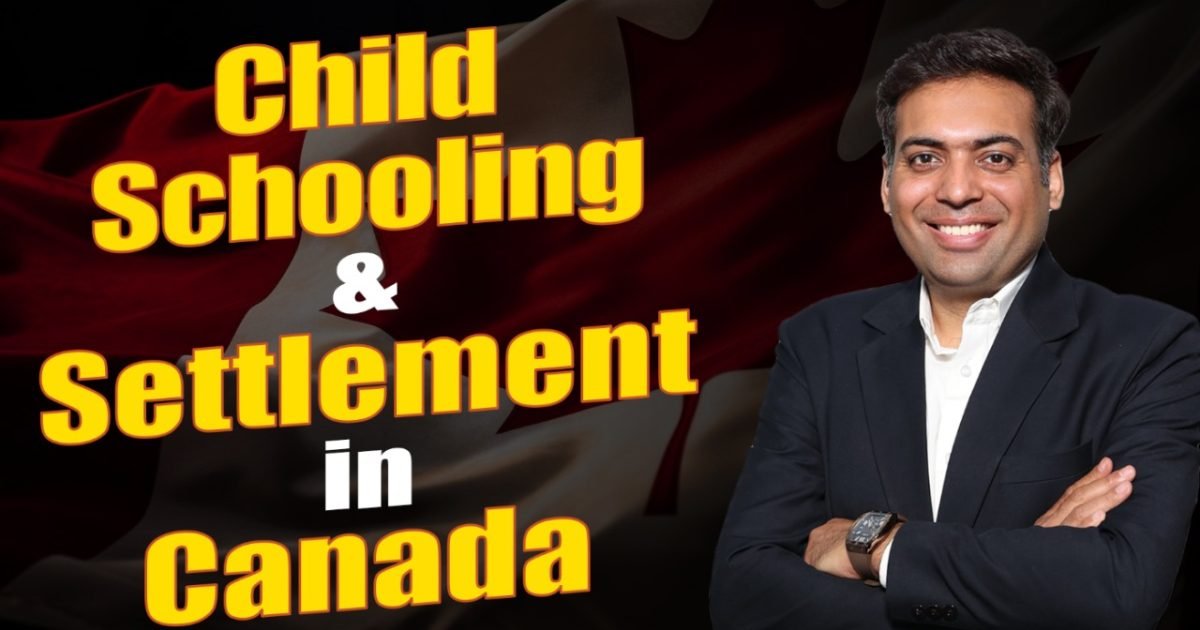Table of Contents
ToggleSchooling and Settlement in Canada for Children of International Students

Studying in Canada is a transformative journey, and for parents, it also means providing a better future for their children. If you’re an international student planning to bring your young children with you, it’s important to understand how schooling, childcare, healthcare, and overall settlement work in Canada. This comprehensive guide from Globexa Immigration outlines everything you need to know about raising and settling your children in Canada while pursuing your education.
1. Who is Considered a Dependent Child?
According to IRCC (Immigration, Refugees and Citizenship Canada), a dependent child is:
Under 22 years of age
Not married or in a common-law relationship
Financially dependent on the parent
This means that whether your child is a toddler or a teenager, they can accompany you while you study in Canada—either on a visitor visa or a study permit, depending on their age and activities in Canada.
2. Schooling for Children of International Students
One of the major advantages of bringing your children to Canada is access to world-class education. In most provinces, children of international students can attend public schools for free, provided the parent holds a valid study permit.
3. Types of Schools in Canada
Public Schools – Funded by the government and free for dependents of international students in most provinces.
Catholic/Public-Faith Schools – Publicly funded but with religious values.
Private Schools – Fee-based education with smaller class sizes and more extracurricular activities.
French Immersion Schools – Great option for bilingual development in provinces like Ontario and Quebec
4. School Enrollment Requirements
Enrolling your child in school is straightforward, but you must be prepared with the right documents. Each school board may have its own rules, but typically you’ll need:
Child’s passport and valid visa/study permit
Birth certificate (translated if necessary)
Parent’s study permit
Proof of residence (utility bill, lease agreement)
Vaccination records and health clearance
Previous school transcripts (if applicable)
Tip from Globexa:
Start gathering these documents before you arrive in Canada. Some school boards even allow pre-registration online.
5. Healthcare Access for Dependent Children
Healthcare eligibility for children varies by province. In general:
British Columbia (MSP) – Covers dependents of study permit holders.
Alberta (AHCIP) – Offers free public healthcare to dependents.
Ontario (OHIP) – Does not cover international students or their dependents initially; private insurance is required.
Manitoba, Nova Scotia, Quebec – Rules may vary; most require private insurance for the first few months or full duration.
Globexa Immigration always recommends clients purchase private health insurance before arriving, especially when studying in provinces without immediate coverage.
6. Daycare and Preschool for Toddlers
If your children are not school-age, daycare is essential so you can attend classes without worry. Canada has excellent daycare services, but demand is high, and costs can be significant.
Types of Childcare:
Licensed Daycare Centres
Home-based Childcare
University-Affiliated Childcare
Private Nannies or Babysitters
Average Monthly Daycare Costs:
Toronto/Ontario: CAD $1,000 – $1,800
British Columbia: CAD $800 – $1,400
Alberta: CAD $750 – $1,200
Some provinces offer childcare subsidies. While international students may not always qualify, it’s worth checking local policies.
7. Settling Your Child in Canada: Culture, Language & Activities
1. Language Support (ESL/FSL)
Children who don’t speak English or French as a first language will get language support in public schools. ESL (English as a Second Language) and FSL (French as a Second Language) programs help students integrate quickly.
2. Cultural Integration
Canada is multicultural and welcoming. Schools often celebrate cultural days and festivals that encourage kids from all backgrounds to feel included.
3. Extracurricular Activities
Your child can enjoy activities like:
Sports (soccer, basketball, swimming)
Music, arts, and drama clubs
Community library programs
Weekend language schools
8. Why Choose Globexa Immigration for Family Study Visas?
At Globexa Immigration, we understand that you’re not just moving for yourself—you’re moving for your family’s future.
Here’s how we support you:
Study visa + child visa planning
Childcare & housing guidance
School enrollment support
Healthcare and insurance recommendations
Post-arrival and PR planning
We offer personalized plans and dedicated family consultation services to make your transition smooth and successful.
Final Words: Your Canadian Dream Starts with Your Children’s Future
Studying in Canada while raising children may seem overwhelming, but it’s a powerful step towards a brighter future. With free education, multicultural support, and access to safe, quality living—Canada offers your child the foundation for lifelong success.
Let Globexa Immigration help you secure that future—for you and your kids.

